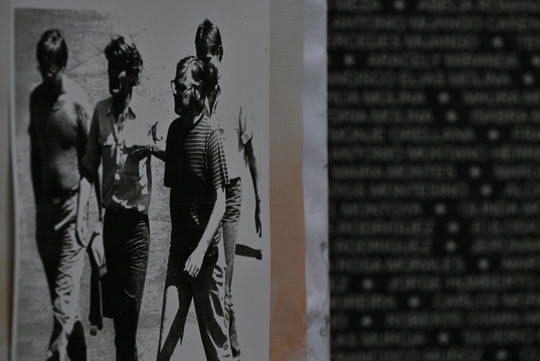Koos Koster, Jan Kuiper, Joop Willemse and Hans ter Laag were part of the team of IKON, the Dutch public TV station, who were murdered on 17 March 1982 when they were in El Salvador for the upcoming election for the Constituent Assembly. Accompanied by five guerrilla members, the reporters were on their way to Chalatenango to cover the conflict when they were ambushed by the army and executed. Only one of the people with them survived.
Five days before the attack, the journalists had been interrogated by the Salvadoran Police, which showed that their activities were being monitored, and three days before the ambush, they had interviewed political prisoners. This context and various pieces of evidence point to the murders having been carried out intentionally with the goal of silencing the press.
Around 700 journalists from all over the world had arrived in the country in 1982 to cover the elections and the armed conflict that the country had been going through since 1980. The situation in the country was one in which there were increasing numbers of accusations of human rights violations. There were also increasing numbers of accusations that the government used death squads to attack the civilian population and social or political activists, and even religious figures, such as the priest Óscar Romero.
The case had remained in a state of impunity due to the Amnesty Law sanctioned in 1993, which protected this type of crime committed during the war. This law was finally declared unconstitutional in 2016. Subsequently, in 2018, thanks to the perseverance of the families of the victims and organisations such as the Fundación Comunicándonos and the Asociación Salvadoreña por los Derechos Humanos (ASDEHU), a complaint was filed and a request was made to reopen the case.
The reopening of the case in 2020 led to the alleged perpetrators being identified and to new evidence being collected. There is now a step towards justice being served in the case in what amounts to an important step towards truth and reparations for the families of the victims.
The defendants are the former Minister of Defence, José Guillermo García, the former Director of the Treasury Police, Francisco Antonio Morán, and former Colonel Mario Adalberto Reyes Mena, who currently resides in the United States and is facing an extradition request. Reyes Mena is accused of being the planner and main person responsible for the murders.
The IFJ, the EFJ, the FEPALC, the Dutch Association of Journalists and the Journalists' Association of El Salvador welcome the new trial as a crucial step towards ending impunity for these crimes against journalists that could set a historic precedent in the country and the region. "There can be no freedom of expression as long as impunity exists, which is why we demand memory, truth and justice for Koos, Jan, Joop and Hans," the organisations said.

